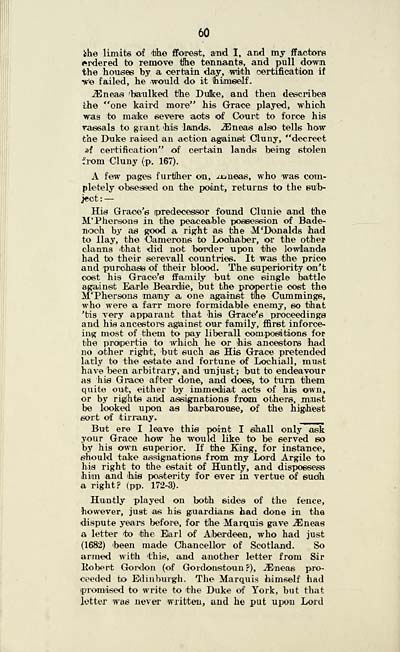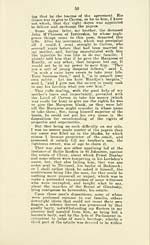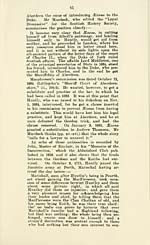1st Duke of Gordon
(64) Page 60
Download files
Complete book:
Individual page:
Thumbnail gallery: Grid view | List view

60
ihe limits of the ffore9t, and I, and my {factors
ordered to Temove tihe tennants, and pull down
the nouses by a certain day, with certification if
*&e failed, he would do it fiimeelf.
iEneas 'baulked the Duke, and then describes
the "one kaird more" his Grace played, which
was to make severe acts of Court to force his
vassals to giant his lands. JEneas also tells how
the Duke raised an action against Cluny, "decreet
#f certification" of certain lands being stolen
from Cluny (p. 167).
A few pages further on, -apneas, who was com-
pletely obsessed on the point, returns to the sub-
ject: —
His Grace's (predecessor found Clunie and t)he
M'Phersons in the peaceable possession of Bade-
nooh by as good a right as the M'Donalds had
to Hay, the Oamerons to Loohaber, or the other
clanns that did not border upon the lowlands
had to their serevall countries. It was the price
and punobass of their blood. The superiority on't
cost his Grace's ffamily but one single battle
against Earle Beardie, but the propertie cost the
M'Phersons 'many a one against tihe Cummings,
who were a fan- more formidable enemy, so that
'tis very apparant that his Grace's proceedings
and his ancestors against our family, ffiret inforce-
img most of them to pay liberall compositions for
the propertie to which he or his ancestors had
no other right, but such as His Grace pretended
latly to the estate and fortune of Lochiall, must
have been arbitrary, and unjust; but to endeavour
as his Grace after done, and does, to turn them
quite out, either by immediat acts of his own,
or by rights and assignations from others, must
be looked upon as barbarouse, of the highest
sort of tirrany.
But ere I leave this point I shall only ask
your Grace how he "would like to be served so
by his own superior. If the King, for instance,
should take assignations from my Lord Argile to
his right to the estait of Huntly, and dispossess
him and bis posterity for ever in vertue of eudh
a right? (pp. 172-3).
Huntly played on both sides of the fence,
however, just as his guardians had done in the
dispute years before, for the Marquis gave iEneas
a letter to the Eiarl of Aberdeen, who had just
(1682) been made Chancellor of Scotland. So
armed with this, and another letter from Sir
Kobert Gordon (of Gordonstoun ?), -iEneas pro-
ceeded to Edinburgh. The Marquis himself had
promised to write to the Duke of York, but that
letter was never written, and he put upon Lord
ihe limits of the ffore9t, and I, and my {factors
ordered to Temove tihe tennants, and pull down
the nouses by a certain day, with certification if
*&e failed, he would do it fiimeelf.
iEneas 'baulked the Duke, and then describes
the "one kaird more" his Grace played, which
was to make severe acts of Court to force his
vassals to giant his lands. JEneas also tells how
the Duke raised an action against Cluny, "decreet
#f certification" of certain lands being stolen
from Cluny (p. 167).
A few pages further on, -apneas, who was com-
pletely obsessed on the point, returns to the sub-
ject: —
His Grace's (predecessor found Clunie and t)he
M'Phersons in the peaceable possession of Bade-
nooh by as good a right as the M'Donalds had
to Hay, the Oamerons to Loohaber, or the other
clanns that did not border upon the lowlands
had to their serevall countries. It was the price
and punobass of their blood. The superiority on't
cost his Grace's ffamily but one single battle
against Earle Beardie, but the propertie cost the
M'Phersons 'many a one against tihe Cummings,
who were a fan- more formidable enemy, so that
'tis very apparant that his Grace's proceedings
and his ancestors against our family, ffiret inforce-
img most of them to pay liberall compositions for
the propertie to which he or his ancestors had
no other right, but such as His Grace pretended
latly to the estate and fortune of Lochiall, must
have been arbitrary, and unjust; but to endeavour
as his Grace after done, and does, to turn them
quite out, either by immediat acts of his own,
or by rights and assignations from others, must
be looked upon as barbarouse, of the highest
sort of tirrany.
But ere I leave this point I shall only ask
your Grace how he "would like to be served so
by his own superior. If the King, for instance,
should take assignations from my Lord Argile to
his right to the estait of Huntly, and dispossess
him and bis posterity for ever in vertue of eudh
a right? (pp. 172-3).
Huntly played on both sides of the fence,
however, just as his guardians had done in the
dispute years before, for the Marquis gave iEneas
a letter to the Eiarl of Aberdeen, who had just
(1682) been made Chancellor of Scotland. So
armed with this, and another letter from Sir
Kobert Gordon (of Gordonstoun ?), -iEneas pro-
ceeded to Edinburgh. The Marquis himself had
promised to write to the Duke of York, but that
letter was never written, and he put upon Lord
Set display mode to:
![]() Universal Viewer |
Universal Viewer | ![]() Mirador |
Large image | Transcription
Mirador |
Large image | Transcription
Images and transcriptions on this page, including medium image downloads, may be used under the Creative Commons Attribution 4.0 International Licence unless otherwise stated. ![]()
| Histories of Scottish families > 1st Duke of Gordon > (64) Page 60 |
|---|
| Permanent URL | https://digital.nls.uk/91797944 |
|---|
| Description | A selection of almost 400 printed items relating to the history of Scottish families, mostly dating from the 19th and early 20th centuries. Includes memoirs, genealogies and clan histories, with a few produced by emigrant families. The earliest family history goes back to AD 916. |
|---|

